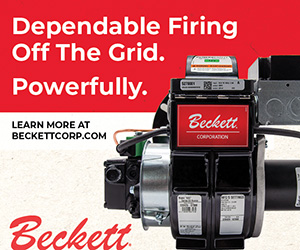
Coil Maintenance
By Diane M. Calabrese / Published February 2018

Immersion heaters have long extended the comforts of home to no-star hotels and short-pocketed travelers who enjoy drinking a cup of tea in their room. Beyond utility, immersion heaters illustrate a key characteristic of a heater coil: over time, scale builds up on the heating element (immersion coil) or in it (hot water pressure washer heating coil).
A frequent traveler who crisscrosses the country soon notices their immersion heater retains its smooth surface in some places while it quickly becomes encrusted in others. There’s nothing like examining or recalling one’s immersion heater to get a firm visual image fix on how a heating coil in a hot water pressure washer may be accumulating scale on the inside wall or all along the route the water takes through it.
Trouble is, we can’t see inside of a heating coil in a pressure washer. So, we must look for symptoms of scale accumulation on the wall around the bore. And, we must commit to preventative measures.
“Coil cleaning should be a part of routine pressure washer maintenance,” says Shane Welch, a team member at Nilfisk HPW, which is headquartered in Redlands, CA. A failure to undertake the routine care could result in a reduction in performance of the pressure washer.
One signal to a contractor that coils of the heater need to be cleaned is “a reduction in performance, specifically in water flow and pressure, as well as back pressure in the system,” says Welch.
“A high percentage of the United States has hard water,” explains Welch. “Areas with harder water will scale up faster than those areas with slightly hard water.”
The term water hardness derives from the actual experience that people had when they tried to wash in it, according to the Water Quality Association (WQA). Hard water is literally hard, or difficult, to wash in.
Although calcium and magnesium are the primary culprits involved in scaling pipes and water heaters, other metallic elements can be involved. The WQA uses the hardness scale established by the American Society of Agricultural Engineers to assign water a degree of hardness.
Hard water has 120–180 parts per million (ppm) of dissolved compounds. Very hard water has more than 180 ppm. Soft water has less than 17 ppm.
Scale buildup can be countered with measures such as coatings on coils and water filters. Coils can be cleaned with soft scrubbing solutions and also with the use of acidic coil cleaners. The acid-based cleaners save time, but they must be used exactly according to instructions.
Welch offers a few cautions for those who choose the acid cleaner route. “First, the proper PPE, personal protective equipment, should be used—preventing contact with skin and eyes, and always conducted in a well-ventilated area,” says Welch.
“Second, use a proper acid that does not damage the material of the coil,” explains Welch. “The acid should be diluted to the manufacturer’s specification. Third, ensure that the processes are completed correctly to prevent damage to the coil.”
Inside and Out
Any maintenance schedule for a hot water pressure washer will include the heating coil. The coil should be cleaned no less than annually and possibly (depending on geographic location and level of use) more frequently. If the reduced performance of the pressure washer indicates the coil may need de-scaling, the descaling should be done then.
It’s not just the inside of a coil that may need attention. Soot on the outside of a heating coil can have a profound effect on heat exchange. If it accumulates, it insulates the coil and interferes with optimal heating of water, even as it makes the heat source work harder (fire repeatedly, for example) to reach the target temperature.
Cleaning soot from a coil is a messy process. With routine maintenance, and with all parts of the system working correctly, soot should not be building up. Routine maintenance takes the full complement of coils connected to a pressure washer into account. For instance, on the electrical side, solenoid coils must also be operating correctly.
Routine maintenance also can indicate when a new coil is the best option. Sometimes it is.
The distributive nature of a spiral makes coils significant components in equipment. Coils pack a lot of surface area into a small space, an efficient design.
Heating coils are special creatures. They not only make hot water pressure washers feasible and nimble with a heat-as-used capability, but they transform the way hot water is delivered to homes and businesses.
Tankless hot-water heaters have long been a mainstay in Europe and Asia. They are being embraced in the United States because they take less space than storage tank water heaters, and they may consume less energy (reduce emissions) than storage tank models (water is only heated as it is used). Stiebel-Eltron is credited with the invention of the first tankless electric water heater in 1929, but there are so many players in the history of the water heater that firsts are difficult to pin down.
What’s interesting is that the tie between the design of the tankless water heater and the hot water pressure washer has become more than an interesting point of convergence. Participants in one agricultural board discussion disclose they see potential in tying their pressure washer to an in-home tankless water heater to boost the cleaning power of their pressure washers. Some have done so already. Some report they are considering getting a tankless residential water heater just to have the option. [Disclaimer: None of the foregoing is recommended in any way, but it demonstrates the ingenuity and inventive spirit—and risk taking—that still defines the nation.]
Q&A With Andres Medrano
Andres Medrano is the service manager at Hydro-Chem Systems Inc. in Caledonia, MI. He provides us with a refresher on and overview of coil maintenance.
Cleaner Times [CT]: Should coil cleaning be part of routine pressure washer maintenance?
Medrano: Yes, cleaning the coil or descaling a coil is an important part of routine maintenance. Since water is heated to temperatures of 180 degrees Fahrenheit and beyond, impurities will precipitate out much faster. [And it’s not just the elements dissolved in incoming water that are a cause for concern.] If the pressure washer injects cleaning chemicals upstream (prior to the pump), scale buildup can also occur from the chemicals.
CT: Have you any cautions about the use of acid-based coil cleaners?
Medrano: An acid-based cleaner will need to be diluted and neutralized after running through the coil. Remember, the solution is acid, so great care should be used when handling it, and proper safety equipment should be used at all times. Refer to the SDS for proper and safe handling instruction.
[The essential steps in cleaning the coil are as follows.] Circulate the acid without operating the burner. All of the acid solution must be flushed from the pressure washer when done. Descale in a well-ventilated area.
There are products available—we manufacture one called Scale Remover—that use acid replacement technology. These products pose less risk to degradation of the coil itself than normal acid cleaners, which use HF [hydrofluoric] or HCL [hydrochloric] acid, and still provide effective scale removal.
CT: What’s a signal to a contractor that the coils of heater may need to be cleaned?
Medrano: There are several: Water is getting hotter than usual. A spike in pressure when the pressure washer is operating in by-pass (over 1000 psi of working pressure). Nozzles getting clogged often is another.
CT: Are there coils beyond heater coils in a pressure washer that should get the attention of a contractor or a service technician?
Medrano: We recommend that any time work is done on a pressure washer, a full PM (preventive maintenance) checkup should be completed by a service technician.
CT: Does scale buildup on heater coils vary widely with geography and the chemical composition of the water being used?
Medrano: Scaling is due to either hard-water deposits and impurities in the water, or soap deposits. Water quality varies greatly around the country. The amount of scaling from hard water is directly relational to the quality of water. Different detergents will also leave scale differently depending on the raw materials used in the formula.
CT: What is the worst that can happen if heater coils are not properly maintained?
Medrano: Discharge water can get extremely hot, which can lead to high pressure hoses blowing and fittings leaking. These situations can cause serious burns on the user. (Scale buildup will restrict the water flow going through the coil and the temperature will rise quickly.)
CT: What should we have asked about coil maintenance?
Medrano: Coils should be cleaned from soot to assure a proper combustion. Carbon deposits on the outer surface of the coil from unclean combustion (smoky) can also reduce heat exchange efficiency. Soot acts like an insulator, which makes it harder for the flame to heat water inside the coil. Even light soot deposits can cause loss of efficient heat exchange.





